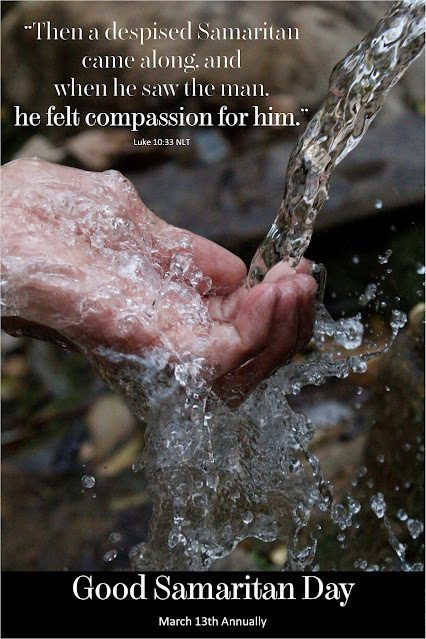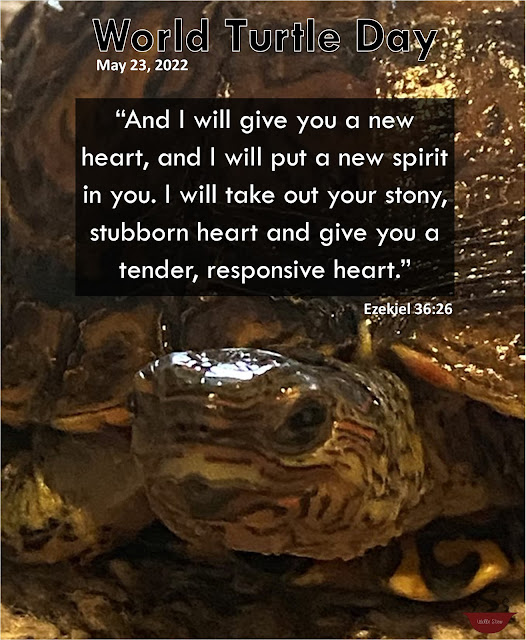National Good Samaritan Day | JOY for Today
Does the story of the Good Samaritan make you uneasy, too? I hear it and I want to believe I would be the one to help, but I don't know that I would. Yet what JOY resulted from the Samaritan's choice to help, at notable risk to himself, when he was under no obligation or expectation to. Let's challenge ourselves to give more than expected from the abundance of joy that overflows in our souls.
JOY for Today Offerings:
- Did You Know... One we didn't.
- Wolfe Stew Connects To being an everyday Good Samaritan.
- Bible Verses and Quotes About Good Samaritans.
- Activity Suggestions To activate everyday Good Samaritans.
- Last Year's Posts: St. Patrick's Day (March 17th Annually) and Spring Equinox (3.20.2023)
Did You Know:
- The Good Samaritan originated in the Bible? Jesus told the parable of the Samaritan in response to a teacher of the law asking for clarification on who he was to love. The teacher was certain that Jesus' response would prove his righteousness. Instead, the story illustrated a higher standard than the teacher anticipated: that we should love everyone - even those we despise. (Luke 10:25-37)
- Samaritans, historically, neighbored but were despised by Jews? Jews, a nation chosen by God, were to strictly adhere to God's law. Samaritans, however, allowed Pagan influences in their religious customs. Due to the differences in their religious perspectives, Jews and Samaritans avoided one another. A Samaritan crossing the street to avoid a Jew (and vice versa) would have been expected behavior during the time Jesus told this parable. (Christianity.com & Biblical Archaeology)
- This parable, told by Jesus, continues to teach us that our actions do matter? A man, injured and close to death, lay on the side of the road. Two men passed by and the last stopped. At the end of the story, Jesus instructs us to model our behavior after the last man. We can believe in our minds and hearts that we love another but demonstrating that love through actions is necessary. (Luke 10:25-37, iBelieve, Christianity.com, Samaritan's Purse, Good Samaritan Services, Good Samaritan, Good Samaritan Society, Office for Victims of Crime and National Library of Medicine)
- In the parable, you are the man dying on the side of the road? While it is instinctual to hear the story and put ourselves in the role of "hero," the intention here is for us to identify with the man on the side of the road and see Jesus as our Saviour - the Samaritan who did not need to but chose to rescue us. (Watermark.org and Christanity.com)
- We are less likely to be a Good Samaritan when we are busy? A well-known psychology study conducted by Darley and Batson found that more than any other variable the perceived level of hurry on the participant had a greater effect on their willingness to stop and help a victim - including when they were headed to speak on the Good Samaritan story! (Babson.edu)
We'd Love to Know:
Which fact most interested to you?
Wolfe Stew Connects
Who in the Good Samaritan parable experienced the most joy? Was it:
- The Samaritan who knew he did a good thing?
- The injured man who benefited from the kindness of another?
- Or the priest and the Levite who successfully avoided an uncomfortable, inconvenient, and potentially dangerous situation?
Each of these people experienced joy, but how?
The Samaritan acted out of a place of joy. He knew that no matter what happened he would be okay. Because of the deep assurance of his unending joy, he took a risk and acted in the best interest of another instead of doing what was safe and comfortable for him.
The injured man received joy. In no place to act, he was completely dependent on the kindness of a stranger. His joy resulted from freely receiving grace lovingly poured out by a stranger.
The priest and the Levite guarded their joy. Thinking of their own potential losses to reputation, safety, cleanliness, resources, and pride, these men chose to detour and in so doing forfeited an opportunity to receive God's joy.
Are you safeguarding your joy? I do. I often make choices that protect my potential losses instead of choosing from a position of assurance in unending joy. But, if, as Dallas Willard defines it, joy is "a pervasive, constant, and unending sense of well-being that flows from vision, peace, righteousness, and hope", then joy should enable us to engage in risk-taking opportunities to minister grace. To show love. To be willing to look stupid to love others recklessly and relentlessly because we trust that our joy tank will never empty.
But don't wait for the "perfect" opportunity. Likely, you won't be walking along a street today and happen upon a despised, severely beaten man who has been left for dead. Instead, recognize the everyday opportunities to act out of a position of unending joy - that enduring sense that no matter what everything really will be okay. Choose to do the inconvenient, uncomfortable acts that bring good to others. Acts like:
- Getting up early on a weekday to make a hearty breakfast for your family so they can start their day in unexpected blessing.
- Biting your tongue when you know your opinion is better. Instead, listen attentively to what is being said and try to learn from their perspective. Even commend them for a respected aspect of their viewpoint.
- Refusing to react in anger to anger. Instead, take a moment to pray for your own anger and the anger of the other person. Ask why they are hurting and work to find ways to move forward in love.
We have the strength and unending joy within us to make choices that spread joy to others, and we are presented with countless opportunities every day to make these choices. Seize the day! Tap into joy and demonstrate extraordinary grace. We need more everyday Good Samaritans.
In response:
- Make your own list of inconvenient, uncomfortable, everyday tasks that could bring good to the others in your life. Bonus points for considering the people in your life who are difficult to love.
- Join us as we grow in respect, by looking at Proverbs 31:12 and 28. Next week we're making our own how-to lists for choosing between good and evil and investigating what being blessed really means. (Take a peek at our Wolfe Notes to see what we covered last week.) Or engage in last year's growth opportunity and allow yourself a RESTART.
Bible Verses and Quotes
Bible Verses
- "The man answered, 'You must love the Lord your God with all your heart, all your soul, all your strength, and all your mind. And, 'Love your neighbor as yourself.'" Luke 10:27 NLT
- "'Right!' Jesus told him. 'Do this and you will live!'" Luke 10:28 NLT
- "But the man wanted to show that the way he was living was right. So he said to Jesus, 'But who is my neighbor?'" Luke 10:29 ERV
- "Then a despised Samaritan came along, and when he saw the man, he felt compassion for him." Luke 10:33 NLT
- "'Now which of these three would you say was a neighbor to the man who was attacked by bandits?' Jesus asked. The man replied, 'The one who showed him mercy.' Then Jesus said, 'Yes, now go and do the same.'" Luke 10:36-37 NLT
Quotes
- “If I do not stop to help this man, what will happen to him?" Martin Luther King, Jr.
- "Not everyone is your brother or sister in faith, but everyone is your neighbour, and you must love your neighbour." Timothy Keller
- "There is a stranger who is more than a friend, and a friend who is worse than a stranger." Michael Bassey Johnson
- "Christian love is loving without counting the cost." Pope Francis
- "A good Samaritan is generally a nobody before and after the good deed." Amit Abraham
We'd Love to Know:
Activity Suggestions
To activate the everyday "Good Samaritan" in all of us.
The Mr.'s Suggestion:
Find a way to help someone out today!You'll know it when you see it. Keep your eyes open for an opportunity to bring good to another.
The Mrs.' Suggestions:
Think about Everyday Ways to Help in a Reflection Journal
For younger kids, have them draw their responses.
- Noticing someone else's need:
- It looked like (name) was hurting today because...
- I could have helped them by...
- Next time I will...
- Reflecting on your own needs:
- Today, it hurt when...
- I would have liked it if someone had...
- Next time I will...
Discuss "Would You Rather..." Questions
- Talk to someone who is crying or help someone who is injured?
- Ask someone for help when you need it or say nothing and hope someone notices?
- Clean up a mess that was not yours or give up your free time to do something kind for another person?
These questions are unique to this post. If you would like three "Would You Rather...?" questions for every March day, download this Wolfe Stew PowerPoint.
Take on the Family Challenge
Read and discuss the parable of The Good Samaritan in Luke 10:25-37. (Every time I read this story, I still visualize the McGee and Me interpretation from my childhood.) Share examples of when you have acted like each character in the story - when you've extended, received, and refused grace. Challenge one another to find examples of grace being extended within the upcoming week and then take the time to share what was observed.
We'd Love to Know:
A real-life Good Samaritan story you witnessed.
We’re excited to share one more day with you and wish you JOY for Today and HOPE for Tomorrow.
Your Partners in JOY Finding,
Find even more JOY for Today in our monthly calendars, holiday, and seasonal posts.





Comments
Post a Comment
Thank you for adding your flavor to the stew.